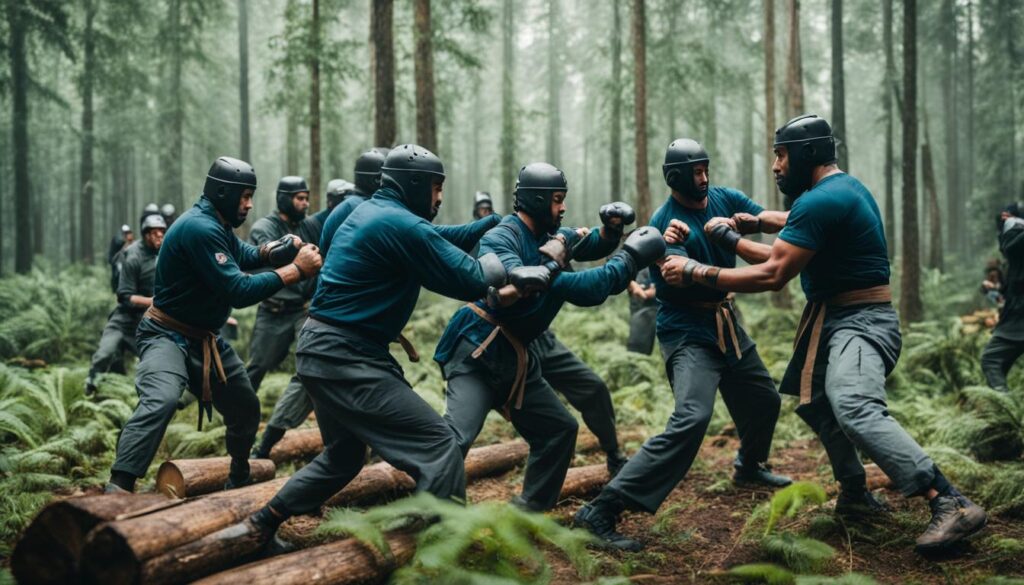
In the world of survival, mental toughness is not just a desirable trait; it is a necessity. When faced with challenging and adverse conditions, having a strong and resilient mind can be the difference between life and death. To truly embrace the survivalist lifestyle, one must prepare not only their physical skills but also their mental fortitude.
Developing mental toughness begins with understanding the importance of mental resilience and strength. It entails cultivating a positive and adaptable mindset, capable of navigating the harshest of circumstances with determination and hope. By prioritizing mental preparation, individuals can equip themselves with the necessary tools to overcome any obstacle that may come their way.
Survival psychology teaches us the profound impact that fear can have on our chances of survival. While fear can serve as an important survival instinct, it can also paralyze us, hindering our ability to think clearly and act rationally. By learning to control fear and negative thinking, we can maintain a positive mindset, allowing us to make informed decisions and adapt to changing situations.
It is also crucial to understand the concept of “give-up-itis,” the dangerous state of losing hope in a survival situation. Hope is an invaluable resource, providing motivation and a sense of purpose even in the most dire circumstances. By recognizing the vital role that hope plays and safeguarding against give-up-itis, we can maximize our chances of survival and resilience.
Ultimately, mental toughness is not just about surviving; it’s about thriving in the face of adversity. It’s about embracing challenges with tenacity, perseverance, and a belief in one’s own abilities. By preparing our minds, we can unlock the extraordinary strength within us and master the art of survival.
Key Takeaways:
- Developing mental toughness is crucial for survival in challenging and adverse conditions.
- Controlling fear and negative thinking is essential for maintaining a positive survival mindset.
- Understanding the effects of fear and the importance of hope can mean the difference between life and death.
- Mental toughness is not just about surviving; it’s about thriving in the face of adversity.
- Preparing our minds equips us with the strength and resilience needed to overcome any obstacle.
The Impact of Negative Thinking and Losing Hope in Survival Situations

Negative thinking and losing hope can have detrimental effects on survival in high-stress situations. When faced with adversity, it is essential to maintain a positive mindset and cultivate optimism. In survival psychology, there is a phenomenon known as give-up-itis, which involves five stages that occur after a traumatic event and can ultimately lead to psychogenic death.
“Give-up-itis refers to the slow, insidious descent into apathy, despair, and eventually death that can occur in extreme survival situations.” – Dr. John Leach
One of the biggest challenges in survival situations is controlling fear and negative thinking. While fear is a natural response that helps us recognize danger, it can hinder rational processing and impede our ability to plan and adapt. To overcome this, techniques like STOPA (Sit down, Take a breath, Observe your emotional state, Plan your next move, Act on that plan) can be employed to manage the fear response and stay focused on the survival task at hand.
The Five Stages of Give-Up-itis
- Stage 1: Social Withdrawal – In this stage, individuals isolate themselves from social interaction and become detached from their surroundings.
- Stage 2: Apathy – Apathy sets in, leading to a lack of motivation, disinterest in survival activities, and neglect of basic needs.
- Stage 3: Aboulia – Aboulia refers to a loss of willpower and decision-making ability, making it difficult to take action or make critical decisions.
- Stage 4: Psychic Akinesia – Psychic akinesia is characterized by a profound sense of hopelessness, helplessness, and defeatism.
- Stage 5: Psychogenic Death – The culmination of give-up-itis, psychogenic death occurs when the body shuts down due to a profound loss of hope and will to live.
Survival situations require a strong survival psychology that emphasizes the importance of maintaining hope, controlling fear, and combating negative thinking. By developing a resilient mindset and staying optimistic, individuals can overcome the challenges they face, increasing their chances of survival.
The Importance of Adaptability and Coping Mechanisms in Survival Situations
Having a rigid mindset limits the ability to adapt and cope with new environmental pressures, which is crucial for long-term survival. In order to increase our chances of survival, it is essential to establish new and effective behavioral responses that align with the demands of the situation.
While training courses often prioritize short-term survival considerations, it is equally important to be prepared to adapt to unexpected environments and develop effective coping mechanisms to maintain hope. The field of survival psychology emphasizes the need to mold oneself psychologically to new conditions, as the ability to adapt can be the difference between life and death in survival situations.
To effectively cope with the challenges encountered in survival scenarios, it is crucial to establish adaptive coping mechanisms. These mechanisms enable individuals to navigate difficult circumstances, manage stress, and maintain a positive mindset. Coping mechanisms can include activities such as journaling, meditation, deep breathing exercises, or engaging in hobbies that provide a sense of calm and distraction. By incorporating these coping strategies, individuals can effectively respond to stressors and enhance their chances of survival.
“Adaptability is not about losing oneself, but rather about finding new ways to thrive in challenging environments.”
The ability to adapt and employ coping mechanisms is closely tied to the survival mindset. A survival mindset involves a combination of mental toughness, resilience, and an unwavering determination to overcome adversity. By cultivating a survival mindset, individuals can navigate through difficult situations with clarity and resourcefulness, increasing their chances of survival.
The Role of Mental Toughness in Overcoming Challenges

Mental toughness plays a vital role in overcoming challenges in survival situations. It is the resilience and strength of the mind that enables individuals to persevere in the face of adversity. Building mental resilience requires daily persistence, unwavering focus, and unyielding motivation.
To enhance mental toughness, it can be beneficial to have a personal quote or mantra that resonates deeply. This empowering phrase serves as a source of extra motivation during tough times, reminding individuals of their inner strength and determination.
“The only way to overcome challenges is to face them head-on and refuse to give up.”
Training to compete rather than merely survive is an effective strategy for developing mental toughness. In competitive situations, individuals are pushed to their limits, testing their mental resilience and fortitude. This type of training instills a sense of determination, strategic thinking, and the ability to thrive under pressure.
Dissociation training plays a crucial role in developing mental toughness. By pushing aside pain and discomfort and focusing solely on the task at hand, individuals can overcome physical and mental barriers. This technique proves invaluable in survival situations, allowing individuals to conquer challenging tasks despite physical discomfort or fatigue.
Finding humor in challenging situations can also contribute to maintaining a positive mindset and enhancing mental toughness. Laughing at oneself or finding amusement in the absurdity of a situation can help alleviate stress and foster a resilient attitude.
Recognizing and working on weaknesses is another essential aspect of building mental toughness. By acknowledging areas that require improvement and actively striving to strengthen them, individuals can transform their weaknesses into strengths. This growth mindset fosters resilience and enables individuals to adapt and overcome challenges more effectively.
Effective planning and goal-setting are crucial for achieving success and maintaining motivation. Breaking down challenges into smaller, manageable milestones allows individuals to track progress and experience a sense of accomplishment along the way. Clear goals provide direction, focus, and a sense of purpose, enhancing mental toughness and determination.
By prioritizing mental toughness and utilizing training techniques tailored to develop resilience, individuals can cultivate the mental fortitude needed to overcome challenges in survival situations.
Mental Toughness Checklist:
- Practice daily persistence, focus, and motivation.
- Create a personal quote or mantra for extra motivation.
- Train to compete and thrive under pressure.
- Utilize dissociation training to overcome physical and mental barriers.
- Find humor in challenging situations to maintain a positive mindset.
- Recognize weaknesses and actively work on improving them.
- Plan and set goals to maintain motivation and direction.
| Benefits of Mental Toughness | Ways to Develop Mental Toughness |
|---|---|
| 1. Resilience in the face of adversity | 1. Practice persistence and daily focus |
| 2. Enhanced problem-solving skills | 2. Train to compete, not just survive |
| 3. Improved ability to handle stress | 3. Utilize dissociation training techniques |
| 4. Greater adaptability to changing environments | 4. Recognize weaknesses and work on transforming them into strengths |
| 5. Motivated and goal-oriented mindset | 5. Plan and set goals for personal growth and achievement |
Building the Body: Physical Preparedness for Survival

While mental toughness is crucial for survival, physical fitness is equally important. Unfortunately, many survival books and resources tend to overlook the significance of physical preparation. To truly be prepared for survival situations, fitness training should encompass a balanced approach that includes strength, speed, endurance, and flexibility.
Strength Training: Developing core strength is particularly important as it not only enhances overall performance but also helps prevent injuries. One effective method of strength training is bodyweight exercises, which utilize the body’s own weight as resistance. This form of training helps in developing strength and stability.
Endurance and Speed Training: Endurance is essential for surviving and thriving in challenging situations. Incorporating activities such as running, swimming, or cycling into your training routine improves cardiovascular fitness and stamina. Additionally, speed training helps build agility, enabling you to react quickly and effectively.
Flexibility Training: Flexibility is crucial in preventing injuries and maximizing your body’s range of motion. Including stretching exercises and activities such as yoga or Pilates improves flexibility and promotes overall wellbeing.
To fully prepare your body for the unpredictable nature of survival situations, it is important to integrate a variety of exercises and training environments. This helps ensure that your body is adaptable and capable of responding to different challenges.
Balancing Strength and Flexibility
Survival training requires more than just physical strength. It is equally important to develop flexibility and mobility. A well-rounded fitness routine that includes strength and flexibility exercises prepares your body for the demands of survival scenarios. By finding the right balance between strength and flexibility, you can enhance your overall performance and reduce the risk of injuries.
“Physical fitness is not only one of the most important keys to a healthy body; it is the basis of dynamic and intellectual activity.” – John F. Kennedy
By investing time and effort into physical fitness, you are not only improving your chances of survival but also enhancing your overall quality of life. Prioritizing both mental toughness and physical preparedness equips you to handle the challenges that may arise, ensuring you can face adversity with confidence.
The Benefits of a Balanced and Dynamic Body
Developing a balanced and dynamic body through fitness training has many benefits for survival. It bridges the communication barrier between the body and mind, allowing for better understanding and response to the body’s signals. Increased confidence in the body’s capabilities fosters resilience and improves the odds of success in adverse situations.
Strength training, particularly focusing on core strength and bodyweight exercises, helps build overall strength and muscle endurance. Flexibility training improves range of motion, prevents injuries, and increases blood circulation. A diversified fitness routine that incorporates different training environments prepares the body for the challenges of survival.
The Importance of Body-Mind Communication
Body-mind communication plays a crucial role in survival preparation. When the body and mind are in sync, individuals can better interpret the body’s cues and respond appropriately. This heightened awareness allows for faster decision-making and adaptability in unpredictable situations.
Confidence: An Essential Asset
Developing a balanced and dynamic body cultivates confidence, which is a vital asset in survival scenarios. Confidence in your physical abilities enables you to push through challenges, overcome obstacles, and make effective decisions under pressure. It boosts mental resilience and enhances overall performance in demanding environments.
Physical Fitness for Survival Preparation
Physical fitness is fundamental to survival preparation. Engaging in regular strength and endurance training builds the physical capabilities required for survival tasks such as carrying heavy loads, traversing challenging terrain, and performing necessary physical exertion. It prepares the body to endure and adapt to demanding situations.
Incorporating flexibility training into your fitness routine improves agility, range of motion, and body coordination. This enhances mobility and reduces the risk of injuries or physical limitations that can hinder survival efforts.
“Physical fitness is not only one of the most important keys to a healthy body, but it is also the basis of dynamic and creative intellectual activity.” – John F. Kennedy
Preparing for Survival
Survival preparation requires a holistic approach encompassing both mental and physical readiness. By developing a balanced and dynamic body through fitness training, individuals can optimize their survival capabilities. Body-mind communication, confidence, and physical fitness are integral components for thriving in survival situations.
Conclusion
Developing a survival mindset requires a combination of mental toughness and physical preparedness. It is the key to thriving in challenging situations. By building a positive mindset, controlling fear, and maintaining hope, individuals can overcome adversity and increase their chances of survival.
Equally important is physical fitness. Strength, endurance, and flexibility training are essential for preparing the body to handle the rigors of survival. A balanced and dynamic body not only boosts confidence but also enhances the body-mind connection, allowing for better communication and response to the body’s signals.
By prioritizing the development of mental toughness and physical preparedness, individuals can equip themselves with the necessary resilience to face any survival situation. With a survival mindset firmly in place and a body ready to adapt and overcome challenges, they can confidently navigate the unpredictable nature of the survivalist lifestyle.
FAQ
Why is mental toughness important for the survivalist lifestyle?
Mental toughness is crucial for survival in challenging and adverse conditions. It can be the determining factor between life and death. A positive and adaptable mindset is essential for maintaining a survival attitude.
What is the impact of negative thinking and losing hope in survival situations?
Negative thinking and losing hope can have detrimental effects on survival. There are five stages of give-up-itis that occur after a traumatic event, leading to psychogenic death. It is important to maintain a positive mindset and cultivate optimism to avoid give-up-itis.
Why is adaptability and coping mechanisms important in survival situations?
Having a rigid mindset limits the ability to adapt and cope with new environmental pressures, which is crucial for long-term survival. It is important to establish new and effective behavioral responses to unexpected situations and develop effective coping mechanisms to maintain hope.
How does mental toughness help in overcoming challenges?
Mental toughness is essential for overcoming challenges in survival situations. Daily persistence, focus, and motivation are crucial for building mental resilience. Training to compete rather than just survive helps develop mental toughness.
Why is physical preparedness important for survival?
While mental toughness is crucial, physical fitness is equally important for survival. Fitness training for survival requires a balanced approach that encompasses strength, speed, endurance, and flexibility. Core strength is particularly important for overall performance and injury prevention.
What are the benefits of a balanced and dynamic body for survival?
Developing a balanced and dynamic body through fitness training has many benefits for survival. It bridges the communication barrier between the body and mind, allowing for better understanding and response to the body’s signals. Increased confidence in the body’s capabilities fosters resilience and improves the odds of success in adverse situations.
What is the role of mental toughness and physical preparedness in the survivalist lifestyle?
Developing mental toughness and physical preparedness are crucial for the survivalist lifestyle. Having a positive mindset, controlling fear and negative thinking, and maintaining hope are essential for survival in challenging situations. Physical fitness, including strength, endurance, and flexibility training, is equally important.


